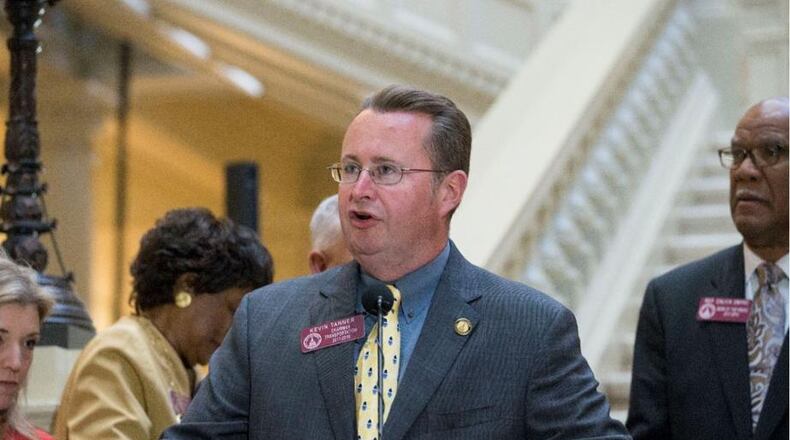A bill that would funnel tens of millions of dollars to mass transit in Georgia has become mired in a debate over whether to consolidate the work of various state agencies.
House Bill 511 would create new programs to aid low-income rural residents and others who need rides. It would pay for those programs by devoting sales taxes on rides for hire to mass transit.
But its most controversial provisions would consolidate state transit functions under a single new agency. Currently, six state agencies have transit programs — a division the bill’s supporters say creates bureaucratic hassles and stifles innovation.
"If it doesn't fit in a box, then it's not happening," state Rep. Kevin Tanner, the bill's sponsor, told the Senate Transportation Committee on Thursday.
Georgia Department of Transportation Commissioner Russell McMurry spoke against the consolidation, saying it could have unintended consequences. Among other things, McMurry said it could complicate the financing of some Georgia Department of Transportation road projects.
He urged the committee to allow GDOT to continue to carry out its transit functions.
“GDOT is fully committed to being fully efficient and effective in all transportation programs,” McMurry said.
Thursday's committee hearing was a testament to the complicated nature of Tanner's effort to revamp Georgia transit funding. Much like last year's legislation that paved the way for transit expansion across metro Atlanta, this year's 71-page bill offers a broad rethinking of transit funding and planning across the state.
HB 511 would divide the state outside metro Atlanta into eight zones for the purposes of transit planning. It would allow individual counties to raise sales taxes for transit construction and operations. And it would create state-funded pilot programs to aid low-income workers and companies that subsidize their employees’ transportation to work.
At Thursday’s meeting, several speakers said the bill would make a big difference in the lives of people who lack transportation. Vicki Johnson of the Georgia Council on Aging said it could help thousands of seniors live independently.
“Many of them find their only option is to enter a nursing home when they really don’t want to and they really don’t need to,” Johnson said. “This will cost taxpayers far more than paying for transportation.”
As written, the bill would dedicate the state sales tax on rides for hire to transit — a tax currently paid by taxi and limousine companies but not by ride-hailing services such as Uber and Lyft.
But Tanner's original bill would have replaced that sales tax with a 50-cent fee on all individual rides for hire and a 25-cent fee on shared rides. Uber and Lyft support the fee but oppose the current bill's sales tax provisions.
But the biggest hurdle to the bill’s passage appears to be its provisions to consolidate state transit services in a single new agency, the Georgia Department of Mobility and Innovation. The bill would eliminate the Georgia Regional Transportation Authority and place two other agencies — the State Road and Tollway Authority and the newly created Atlanta-Region Transit Link Authority — under the new agency.
Tanner, a Republican from Dawsonville, says creating a single agency dedicated to transit would ensure its employees are focused on removing barriers that impede the development of public transportation in rural areas. He says the new department would work with private companies such as Uber and Lyft as well as local governments to encourage innovative programs.
“This is not about the government going out and buying buses,” Tanner told the committee Thursday. “This is about creating an atmosphere of innovation.”
The State Transportation Board, which oversees GDOT, opposes the consolidation. Among other things, McMurry urged the committee to keep the SRTA administratively attached to GDOT, rather than attaching it to the new transit agency.
The SRTA oversees the state’s Xpress bus service and collects tolls on metro Atlanta express lanes. But it also handles the financing of some major GDOT road projects. McMurry said creating a barrier between the agencies could complicate financing for such projects.
Tanner doesn’t believe his plan would change the SRTA’s operations. But it’s unclear whether he can muster enough support to overcome GDOT’s objections.
The Senate Transportation Committee chairman, state Sen. Brandon Beach, R-Alpharetta, told Tanner he would keep in touch in the coming days. But he provided no timetable for a committee vote as the legislative session winds down to its last day on April 2.
Supporters of the bill hope it isn’t derailed by bureaucratic concerns.
“I’m optimistic that many of the positive changes contained in HB 511 received attention today,” said Johnson, the senior advocate. “I hope they realize the existing status quo leaves too many people without transportation.”
Stay on top of what’s happening in Georgia government and politics at ajc.com/news/georgia-government/.
About the Author
Keep Reading
The Latest
Featured


